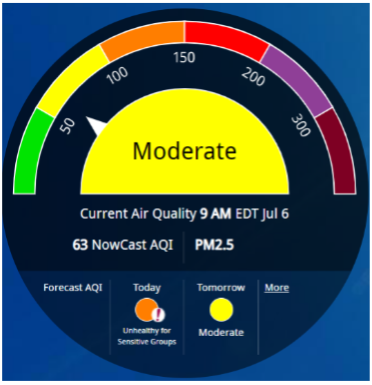Protecting Yourself from Unhealthy Outdoor Air
July 12, 2023 Steven Deck
UMB monitors air quality in our area and works with units that have people impacted when outdoor air quality is poor.
Summer in Maryland can be hot and humid and include unhealthy air quality. Additionally, this summer’s air quality has been negatively impacted by smoke from wildfires in Canada.
The main risk from wildfire smoke is particulate matter. The Environmental Protection Agency (EPA) describes particulate matter as containing “microscopic solids or liquid droplets that are so small that they can be inhaled and cause serious health problems.”
According to the EPA, health risks from particulate matter can be greater for children and teenagers, older people, minority populations, those working outdoors, and people with preexisting conditions such as heart and lung disease. Actions to take on days when outdoor particulate matter levels are elevated include:
- Moving outdoor activities indoors or to times when the air quality better
- Reducing outdoor activities
- Doing less-strenuous outdoor activities such as walking instead of running
The University of Maryland, Baltimore (UMB) monitors air quality in our area and works with units that have people impacted when outdoor air quality is poor. In addition, as part of UMB’s COVID-19 response, the Office of Facilities and Operations enhanced the effectiveness of the filtration for our building ventilation systems. Improved filtration is effective at significantly lowering indoor particulate matter levels.
The EPA has developed a tool, AirNow, to provide real-time information on outdoor air quality levels. AirNow provides the current Air Quality Index level for a location along with the air quality forecast for the remainder of the day and next day. The website also provides guidance on what to do to protect yourself on unhealthy outdoor air quality days. To learn more on the EPA’s guidance for reducing your risk to unhealthy outdoor air, see its Air Quality Guide for Particle Pollution and Air Quality Guide for Ozone.
The North Atlantic Fire Science Exchange provides a tutorial on YouTube on Utilizing the AirNow site. You can download the AirNow app for free at the Apple App Store or the Google Play Store and sign up for air quality alerts by subscribing to EnviroFlash.
Lastly, talk to your health care provider about any concerns you might have about how outdoor air quality can affect your health. If you do not have a health care provider, consider using Campus Health, located on the UMB campus at 408 W. Lombard St.